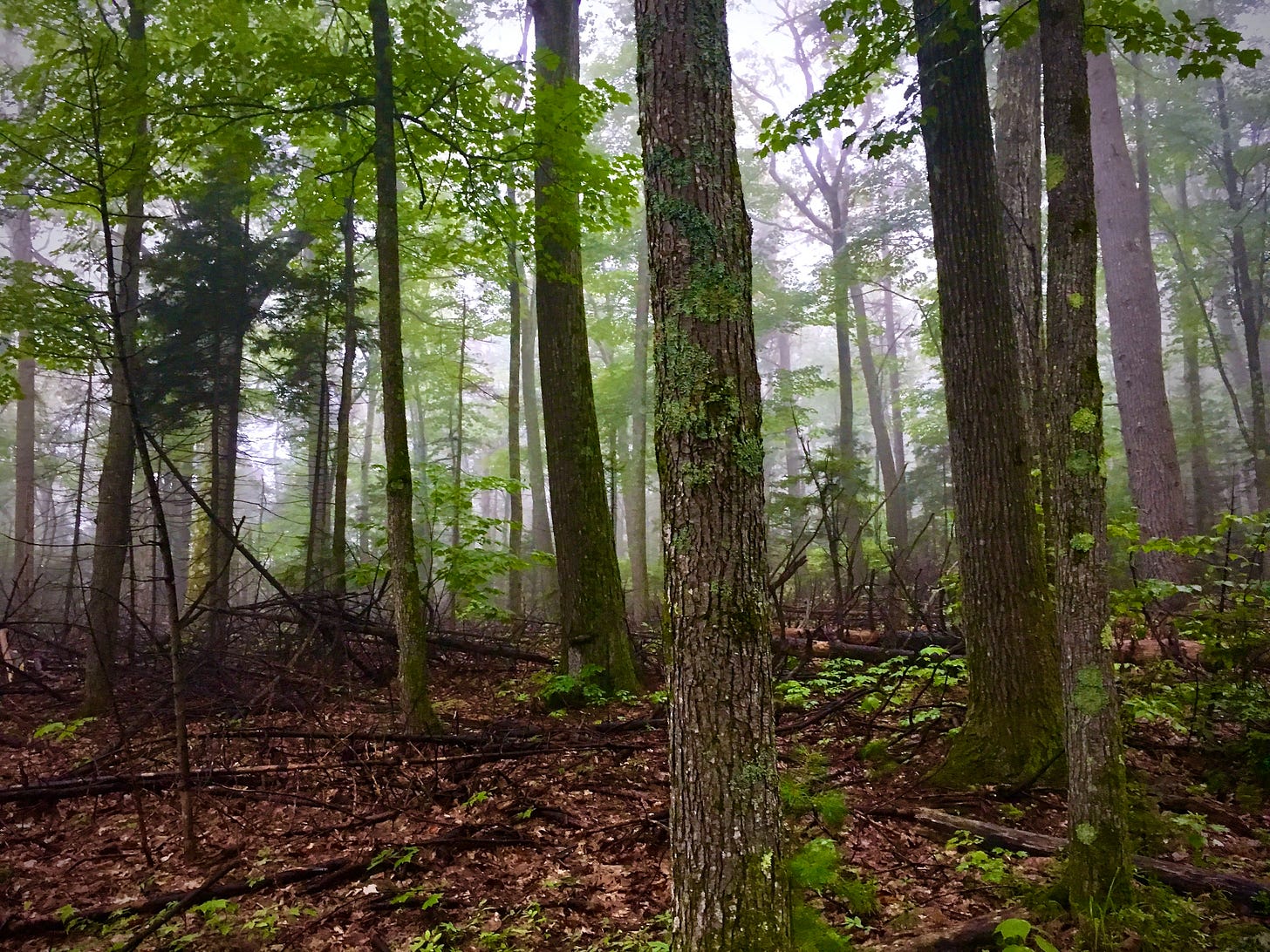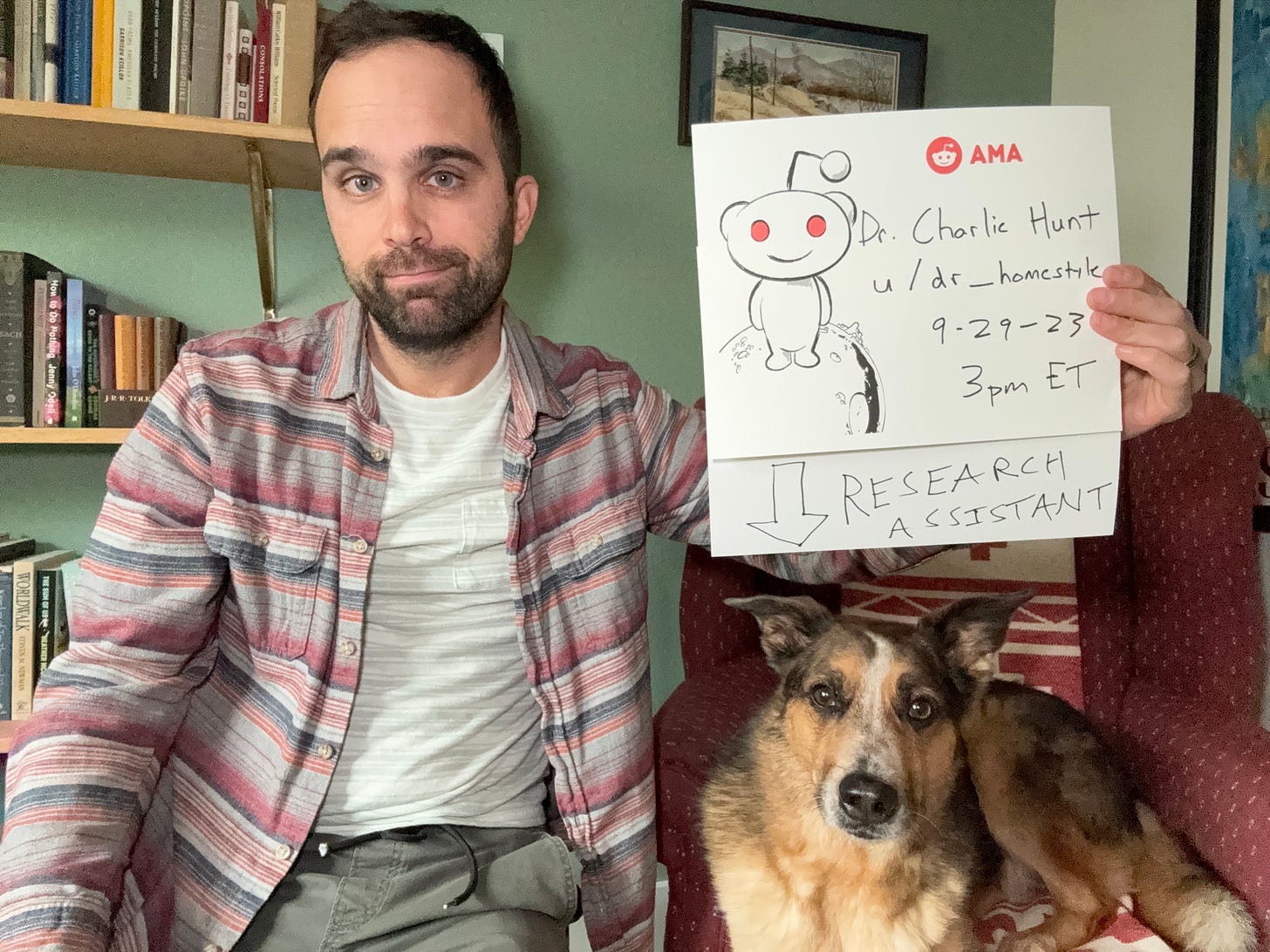Place Poem: "Lost" by David Wagoner
Plus, some "place picks" to end the week.
Happy Friday, and welcome back! In the weeklong space between major posts, I want to try out a little something that is comfortably outside of my regular political expertise, and offer what I’ll call a “place poem”—a work of poetry that I really enjoy, and which has some clear element of what the wonderful Jenny O’Dell calls “placefulness”—a sense of inhabiting a particular space in a way that draws attention to its uniqueness, its history, and even its ecology.
This week’s poem is by David Wagoner, who produced more than two dozen collections of poetry between 1953 and 2012, and was also a prolific fiction writer; he passed away just recently in 2021.
Here’s my very favorite poem of his, which I first came across in the sensational and thought-provoking book In The Shelter by one of our Earth’s true gems: author, poet, and thinker Pádraig Ó Tuama, who’s fabulous Poetry Unbound Substack is a must-subscribe.
Lost
by David Wagoner
Stand still. The trees ahead and bushes beside you
Are not lost. Wherever you are is called Here,
And you must treat it as a powerful stranger,
Must ask permission to know it and be known.
The forest breathes. Listen. It answers,
I have made this place around you.
If you leave it, you may come back again, saying Here.
No two trees are the same to Raven.
No two branches are the same to Wren.
If what a tree or a bush does is lost on you,
You are surely lost. Stand still. The forest knows
Where you are. You must let it find you.I think there’s a lot more to this poem than meets the eye. On the surface, the “message” of the poem (to the extent any poem has a message) seems clear: be in the moment, be here now, etc etc. All the easier-said-than-done things we’re implored to do by people with suspiciously well-polished Instagram accounts.
But it’s the tone of this poem, I think, that gives it power. It’s terse and prescriptive in a way that poems often aren’t: it doesn’t ask, but instead commands you (twice) to “stand still,” and also to “listen.” It demands that you “must ask permission” to know what it means to be Here (with a capital “H”); you “must let it find you.” These aren’t suggestions or lifestyle tips. The stacatto-like rhythm of the lines feels like a speech a general might make to his cadets in the military. For a poem that could reasonably be called a “nature poem,” it sure does rely on sometimes-harsh authority to get across its meaning. Compare it with Mary Oliver, whose poems are known for their gentle, flowing first-person musings. Wagoner’s poem is as second-person as it gets (he uses the word “you” 11 times in a 12-line poem). We’re often following Oliver from a distance on her daily walks around the woods; in this poem, it’s like Wagoner is leading us forcefully by the arm, guilting us into shutting the hell up and looking around. He, the forest, and the poem itself, all refuse to drop their gaze upon us until we’re willing to internalize Where We Are.
But beyond its tone, this authority comes from the depth, the stability, and the rootedness of the forest at the heart of this poem. "In the world of Wagoner's poem,” Ó Tuama comments in In The Shelter, “it is the rooted things - trees and bushes - that tell the truth to the person who is lost." It is the solidity, the tangible state of the trees as a “powerful stranger,” that can ground you and help you be found.
But you don’t need to be standing in an old-growth forest to get something out of this poem. I love it because the poem itself draws your attention with its authority; in doing so, it has the effect the poem’s words are aiming for. It brings you into your body, into your surroundings, and into Here, wherever that is for you.
Place Picks
Aside from hoping you enjoyed the poem, I thought I’d also share a few other “place picks” of mine that have been in my mind over the last couple of weeks. I’ll put the same disclaimer here that I put at the top of the syllabus for the courses I teach every semester, which is that I reserve the right in the future to abandon and take up new categories as I please. But for now, I’ll settle on some music, podcast, and reading suggestions that feature "place” in some way.
Music
“San Luis” by Gregory Alan Isakov (Apple Music / Spotify).
This fellow has been one of my quiet favorites for the last few years, ever since I saw him at the Newport Folk Festival back in 2019. According to his Bandcamp page, he is—in addition to a Grammy-nominated folk singer-songwriter—a “full-time farmer who sells vegetable seeds and grows various market crops on his three-acre farm,” which apparently is located just north of the small Colorado town Isakov is referencing in this beautiful song. His recently-released album, Appaloosa Bones, continues his embodiment of Americana—both the genre of music, and the concept itself.
Podcasts
"The Soundtrack of Australia", from Nature Track.
Take it from me, you do not need a third/fourth/fiftieth “week in political commentary” podcast. You need this instead (I’m being prescriptive like the poem we just read—get it?). “In 1977, we sent a Golden Record of the sounds of Earth into space with NASA's Voyager probes,” The Australian Broadcasting Company (who produces this podcast) describes. “This 'cosmic' calling card inspired the program team to make this - a golden record of Australian sounds.”
If you can spare a half hour, do yourself a favor and immerse yourself in this episode, ideally with headphones. It showcases the vastness of Australia, its people, its places, and perhaps most importantly, its wildlife.
Reading
“America’s Surprising Partisan Divide on Life Expectancy”, by Colin Woodard in Politico Magazine.
This is a tough and depressing one to read (you’re welcome!) but boy is it revealing. Aside from Woodard’s insightful re-categorizations of U.S. regions, which he pioneered in his 2012 book American Nations, he dives into how geography blesses—and curses—certain parts of our country more than others in terms of life expectancy.
So much of this is intertwined (or “co-linear”, as we would say in political science)—for example, the South is also generally poorer than other regions, and has very different healthcare policies at the state level than its peer regions.
The life expectancy differences are, as Woodward puts it, “the result of differences that are regional, cultural and political, with roots going back centuries to the people who arrived on the continent with totally different ideas about equality, the proper role of government, and the correct balance point between individual liberty and the common good.”
Regardless, there’s no escaping the fact that our country is decidedly not geographically equal in terms of quality of life.
Finally, a quick announcement: if you happen to be a Reddit user (or lurker), I’m doing an “Ask Me Anything” in the r/politics subreddit later today (Friday 9/29) at 3pm Eastern Time (1pm MT). They made me take this ridiculous picture, so you might as well see it:
I’ll be doing this in collaboration with the excellent academically-focused nonprofit news outlet The Conversation, for which I’ve published a few things over the last year or so. It’ll be a wide-ranging AMA, but mainly focused on the intersection of age and American politics; so, for example:
How we seem to be ending up with two 80- or close-to-80 year olds as our presidential candidates
Why young people don’t engage in politics at high rates, and why this is very much not Gen-Z’s or Millennials’ faults
Whether Millennials have different governing styles than other generations
… plus whatever weird shit the Reddit community decides to ask me about.
Feel free to join in the fun, particularly if you’d like to be a plant and ask questions like “Are all political scientists as cool as you are?” and “Not so much a question, but your dog should be a model for Purina!” Totally up to you.
P.S. — As a new Substack, I understand you’re still getting to know me. You might be wondering what you can expect from me going forward. In case you’re that curious, here’s a teaser of the ol’ publication schedule:
See you next Friday!







Wow I am so impressed you already have so many posts scheduled 😆
Enjoyed this very much. Great way to begin my Friday. Looking forward to those future posts, especially Applebees and Zelda